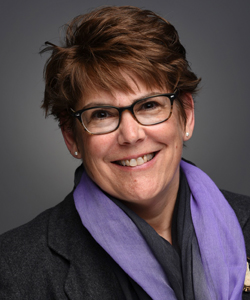“We need to help a lot of people at this time, and the challenge is trying to figure out how to get that out there to people,” says Holly Kapusinski, MSN, RN NC-BC. Kapusinski is a board-certified integrative nurse coach. In 2018 she founded  Life Cycle Balance, which offers integrative health and wellness assessments, nutritional plans, stress management and therapeutic awareness practices, among other services.
Life Cycle Balance, which offers integrative health and wellness assessments, nutritional plans, stress management and therapeutic awareness practices, among other services.
“We have all seen on social media the effects, the fear that is encroaching on people, and not just fear, but mental health issues that will result from this crisis,” says Kapusinski. “So many health issues are a result of stress. That’s where somebody in my position, with a nursing background, comes in.”
Kapusinski started her career as a pediatric nurse. She received her nursing diploma from Akron City Hospital’s Idabelle Firestone School of Nursing in Ohio. She went on to obtain her Master of Science in Nursing degree from the University of Akron. “I moved to Florida, which meant I had to get a Florida nursing license, and I worked in a high-level pediatric hospital,” she recalls. “Then I got married and I became a military spouse, and I suddenly had an Ohio license, a Florida license, and then a Mississippi license, and I had to keep all of those going. Eventually, having a compact license was a beautiful thing because I was still able to move around. I have a home state and am able to practice in different places.”
After taking time to raise a family, Kapusinski decided to return to nursing. “I had always been holistic-centered in my career,” she explains. “I saw a great opportunity to combine my nursing experience with coaching. I became an integrative nurse coach and opened up my own private practice with the intention that I would approach health and wellness from a whole-person perspective. We don't only deal with a person’s chronic condition, but with their whole life and the whole person.”
Kapusinski finds great fulfillment in group coaching and offers programs in local libraries in her area on the Gulf Coast of Mississippi and in Louisiana. “I would like to go into Alabama as well, to provide these services at a group level so that more people can have the experience, and with people that might not be able to pay for services,” she says. “I have also reached out to first responders, firemen and police, to provide the same kind of care for them. There is also a women’s center in Louisiana where I provide services. I would not be able to do that if we were not in the compact.”
Kapusinski also volunteers her time with the New Orleans Medical Reserve Corps, a group of volunteers with the expertise to supplement public health emergency preparedness and response efforts in New Orleans. “I’m able to participate because of the compact,” she says. “I can in other states as well -- Mississippi or Alabama or Florida or anywhere else that might need volunteers to help out in this kind of a situation. I was just there last Saturday getting trained on the COVID-19 pandemic and getting updated on what they were going to need and how we could help.”
While the compact has afforded Kapusinski the opportunity to help others, through her work via Life Cycle Balance and volunteering, there is one area – a personal one – where she wishes she could do more. She shares that her sister, who lives in Ohio, has been struggling with breast cancer. “She asked me to be on her medical team to make decisions and guide her care, but unfortunately I can’t do that as a nurse because Ohio is not in the compact,” she says. “I would love to be able to talk to physicians and recommend things and then work with her in a more personal way as a nurse, but I cannot at this time.”
At the heart of the NLC is the idea that removing barriers to practice will result in better outcomes for patients. Natural disasters and pandemics know no boundaries, and neither should a nurse’s ability to go where they can serve. “Nurses are wonderful at being present to people,” explains Kapusinski. “When we go, and we are ‘nursing’ a person, we are there completely. We are listening, we are observing, and we are there hearing them. I think that is why we are trusted so much. It’s because we are the presence that people are lacking.”
 The spread of COVID-19 has shown that a virus is not impacted by boundaries. Neither should barriers to licensure. Now and in the near future, medical professionals across the country will seek to go where they are needed to provide vital care, by crossing state lines physically or via telehealth. While emergency declarations have temporarily lifted some restrictions on licensure, a crisis like the one we are facing is a sobering reminder that having all U.S. states and territories in the NLC would streamline this process for the next health crisis or natural disaster.
The spread of COVID-19 has shown that a virus is not impacted by boundaries. Neither should barriers to licensure. Now and in the near future, medical professionals across the country will seek to go where they are needed to provide vital care, by crossing state lines physically or via telehealth. While emergency declarations have temporarily lifted some restrictions on licensure, a crisis like the one we are facing is a sobering reminder that having all U.S. states and territories in the NLC would streamline this process for the next health crisis or natural disaster.
